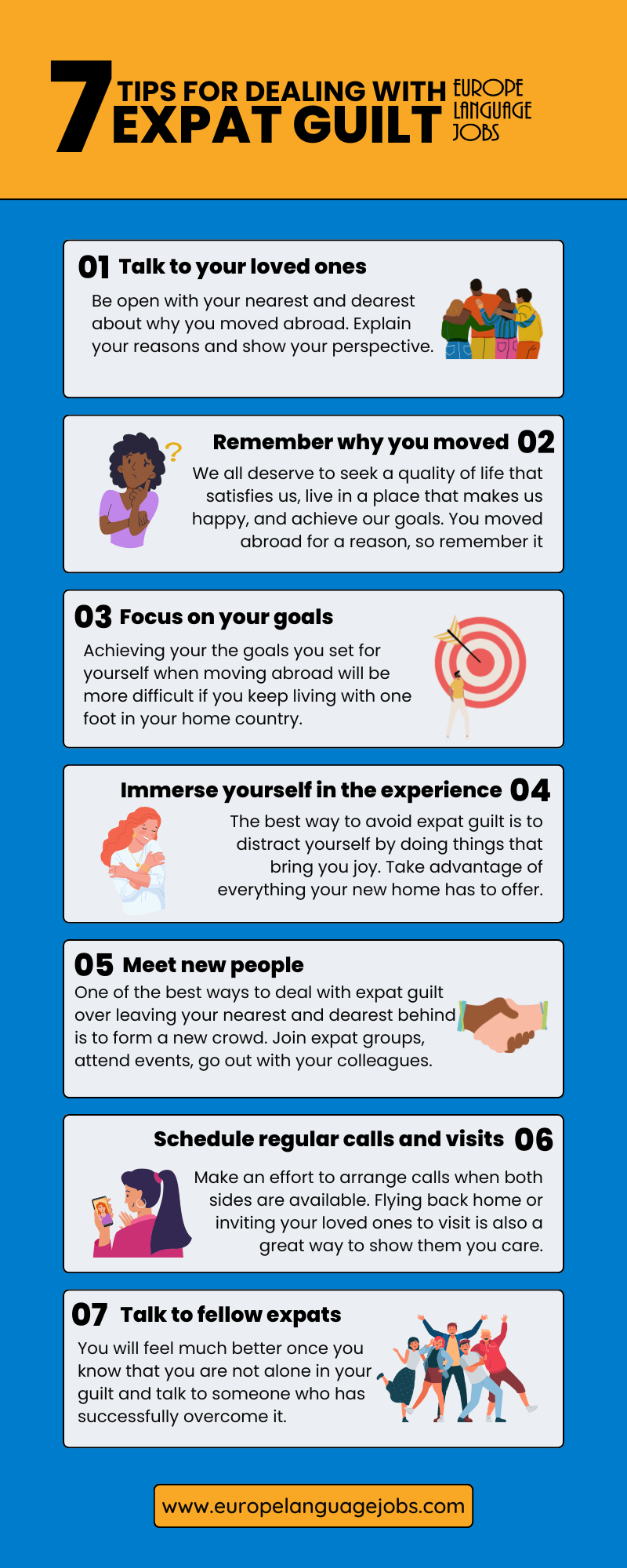Sooner or later, most expats start feeling the expat guilt. It usually happens when the period of novelty begins to fade and reality starts to sink in. We start missing the loved ones we’d left behind and begin to question whether we’d made the right decision.
Expat guilt is a common phenomenon, and it is completely normal to feel that way. At Europe Language Jobs, we are a team of expats who know exactly what it is like to be in this situation. We have compiled a list of tips to combat expat grief, which have worked repeatedly in our experience.
Before we share our advice, let’s ensure we all know what expat guilt is and what it feels like.

What is expat guilt?
Expat guilt is blaming yourself for moving abroad and leaving your loved ones behind. Many expats feel selfish for choosing to live in another country and fear those they care for may not understand their decision or hold it against them.
How do you get over expat guilt?
Expat guilt is something many of us have to prepare for when moving abroad. Unfortunately, the only way out is through - but there are some things you can do to deal with this unpleasant feeling.
- Talk to your loved ones
- Remember why you moved
- Focus on your goals
- Immerse yourself in the experience
- Meet new people
- Schedule regular calls and visits
- Talk to fellow expats

1. Talk to your loved ones
An honest conversation is often the best solution. Expat guilt usually occurs when we assume what our loved ones think of our decision to leave. More often than not, such assumptions are wrong and lead to self-induced guilt.
Be open with your nearest and dearest about why you moved abroad. If they struggle to see it from your perspective, assure them that your decision had nothing to do with them.
Some expats move to another country for financial reasons, others for love, and others are simply born restless and crave to explore constantly. All of those reasons are equally valid, but remember they may not be as obvious to someone who doesn’t experience them first-hand.
If you suspect those you care about might feel like your leaving had anything to do with them, explain that this is not the case. It is perfectly natural to love someone and still want to experience living abroad.
It certainly doesn’t mean you don’t care about someone enough. More than one thing can matter to us, and it’s okay to chase your dreams and fulfil your goals.
Sometimes, the guilt is all in our heads. Your loved ones could just be happy for you and wish you the best on your adventure. Talking to them about it openly might ease some of the weight off your shoulders.

2. Remember why you moved
There is usually a reason for moving abroad. Sometimes, it is out of necessity - for a higher salary, better work-life balance, or lower cost of living.
Other times, living in another country is something we just want to experience. We’d like to explore a different culture, boost our CV, or start a new life in a fresh place.
Focusing on your reason is a good way to deal with expat guilt. In moments of weakness, remember why you took the leap.
No reason is selfish - regardless of whether life pressures you to move abroad, or you make that decision yourself. We all deserve to seek a quality of life that satisfies us, live in a place that makes us happy, and achieve our goals.
Someone dreams of building a house. Someone else craves a family. Someone else strives to make a career as an actor above all else. You want to live abroad. And that’s okay.
We all have different goals. And we all have to sacrifice something in order to fulfil them. There are people who live in the same city but barely see their loved ones because they work long hours or study to become lawyers or engineers or doctors.
Being considerate of other’s feelings shouldn’t stop you from living the life you want for yourself. Prioritising your goals and needs is not selfish.

3. Focus on your goals
If focusing on your reasons for moving abroad isn’t effective anymore, turn your attention to the future and remember your goals.
What do you want to achieve by living in another country? Discover a new culture? Earn more money? Meet people? Learn a new language?
Achieving those things will be more difficult if you keep living with one foot in your home country. You can’t move forward looking backwards.
If you don’t do the things you planned to do, your move abroad will be pointless. You have already made the decision and said your goodbyes, so your job now is to make the best of it. Don’t let everything you had to sacrifice go to waste because of expat guilt.
Focusing on your goals will help keep you motivated when expat guilt becomes too suffocating. Crafting a plan and completing the steps towards fulfilling it will keep you busy and take your mind off missing home, until you start to genuinely enjoy your time abroad.

4. Immerse yourself in the experience
Expat guilt can make you think that you shouldn’t enjoy yourself too much during your time abroad. It can stop you from engaging in activities because having too much fun makes you feel selfish.
We’ve all been there and trust me when I say that the solution here is the exact opposite of what initially feels right. You need to dive deep into your life abroad and embrace your new reality.
Guilt has a way of sucking the joy out of everything we do until we literally begin to drown in it. The best way to avoid that is to distract yourself by doing things that bring you joy.
Go for a walk, explore the streets of your new city, organise a weekend trip, sign up for local workshops, or attend cultural events.
Expat guilt is more likely to strike if you feel like a stranger in your new home. Getting used to your surroundings and forming a routine will help you ease into the new experience and begin to feel grateful for the new opportunity rather than selfish for enjoying it.
Your loved ones will also be happy when they see you’re happy. Allowing expat guilt to make you feel miserable will have an impact on them as well. Knowing you’re settling in and embracing your new life will ease their concern and make coming to terms with your being abroad easier.

5. Meet new people
Paradoxically, one of the best ways to deal with expat guilt over leaving your nearest and dearest behind is to form a new crowd.
This doesn’t happen overnight. Making friends abroad is a long process, but it doesn’t mean you shouldn’t systematically work on it from the very start.
Join expat groups on social media and attend events organised there. Buy a gym membership, sign up for language classes, or join your coworkers for an after-work beer.
If you don’t know anyone in a new place, it is natural to cling to your relationships back home. It’s easy to start questioning your decision to move to another country when all your friends and family are somewhere else.
Forming new relationships is yet another way to merge into your life abroad. Personal bonds give you a convincing reason to stay. They anchor you in the here and now so that you lose the habit of looking back over your shoulder.
Don’t let expat guilt hold you back from meeting new people. Life goes on without you back home, so it is only fair you move on with yours as well.

6. Schedule regular calls and visits
It is very important to note that there is a difference between meeting new people and replacing your old relationships with new ones. It is all too easy to lose yourself in the excitement of starting your life from scratch in a new place.
Once your expat guilt passes, you may even feel the need to limit your contact with everything that reminds you of your “old life” and dive head-first into your new reality abroad. After all, this makes you forget about the guilt, and humans are designed to seek instant gratification.
One way to avoid disconnection and being eaten alive by expat guilt is scheduling regular calls with your loved ones and arranging visits back home.
Moving to another country is an entire process that will keep you busy at first - opening a bank account, finding a flat, getting settled, and learning the city. Therefore, initially, you may not have the time to chat with people back home as often as you used to.
Make sure they understand it and make an effort to arrange calls when both sides are available. Flying back home or inviting them to visit is also a great way to show them you care.
However, don’t fall into the trap of going back home too often - after all, the point is to settle into your new life, not hold on to the old one. But regular visits and calls will help you both demonstrate your commitment and get over expat guilt.

7. Talk to fellow expats
Sometimes, what we crave the most when feeling down is to be understood. And no one understands an issue better than somebody who has experienced it as well.
If you know someone who has also moved abroad, talk to them. It doesn’t have to be someone in the same country as you - some experiences are very similar, regardless of the location.
Don’t worry if you don’t know any other expats yet. There are communities you can join, such as Internations, uniting expats in different cities all over the world. You can also search for groups on Facebook, such as “Expats in (your city)”.
We encourage you to join our expat community on Discord, where you can chat with fellow expats, ask our staff questions about living in another country and finding a job abroad, and find support.
Such communities are the right place to ask your questions or share your doubts, and the members are usually very supportive. They are a great way to make friends abroad and find someone who may share your grievances.
You will feel much better once you know that you are not alone in your guilt and talk to someone who has successfully overcome it. Ironically, those you would usually go to for support may not understand you this time if they haven’t moved abroad themselves, but a fellow expat definitely will.
Although expat guilt touches a great number of people moving abroad, it doesn’t mean that we should just silently suffer through it. There are things you can do to help you feel better, including focusing on your goals, being honest with your loved ones, making the most out of your experience abroad, and regularly keeping in touch with everyone at home.
Don’t be afraid to admit to feeling expat guilt - a problem shared is a problem halved, so talking about it with your loved ones and fellow expats will take some weight off your shoulders. They can offer you the support you need until you learn how to deal with it on your own and embrace your new life abroad.
Feeling inspired? Visit our blog for more career advice! How can you be sure the information we provide is top-notch? We are a group of professionals working with recruiters, career coaches, and HR specialists from all over the world!
Trust our experience and let us help you find a new job in Europe!















Zerai-Maya Soulier10mo ago
Moving back can be even harder...For instance, after 10 years in London I expected that my home country, France in my case, would have kept up with the times. After 4 years of being back here full time, I am quite surprised at the way certain things are done.
Moving back can be even harder...For instance, after 10 years in London I expected that my home country, France in my case, would have kept up with the times. After 4 years of being back here full time, I am quite surprised at the way certain things are done.